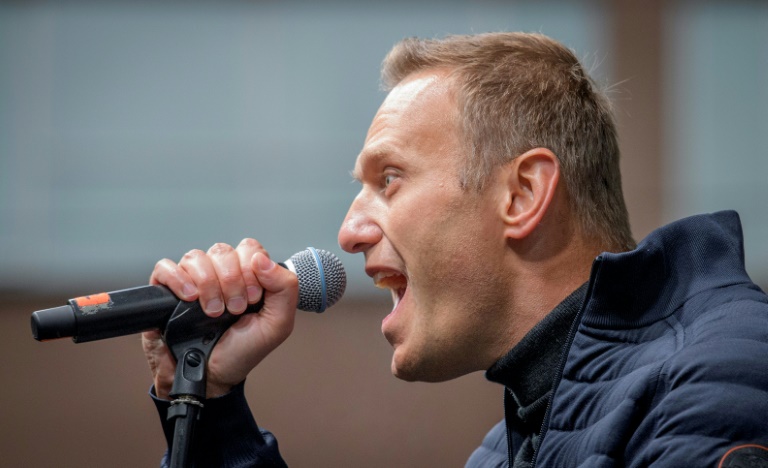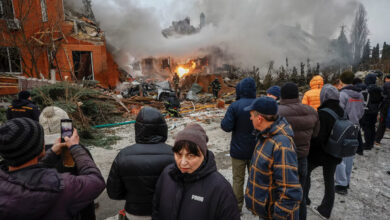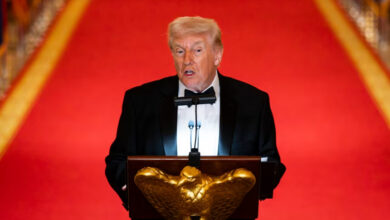
Russian investigators raided opposition offices across the country on Tuesday, in the latest move to increase pressure on top Kremlin critic Alexei Navalny and his allies.
The early morning raids targeted more than 100 offices and homes in 30 cities, the opposition said, including the headquarters of Navalny’s Anti-Corruption Foundation (FBK) in Moscow.
An AFP journalist saw several armed interior ministry officers in black balaclavas entering the business centre hosting his offices, where agents reportedly broke through the doors to enter the premises.
Navalny, an anti-corruption campaigner who has emerged as President Vladimir Putin’s most prominent critic, denounced the raids as an attempt to intimidate the opposition after a summer of protests and significant losses suffered by Kremlin allies in local elections in September.
“This will not stop us,” he said in a post on his blog shortly after the raids began. “We are doing the right thing. And those who are against us are enemies of Russia.”
The raids followed similar mass searches last month and came less than a week after Navalny’s foundation was declared “a foreign agent”.
Russia’s Investigative Committee said in a statement that searches were underway at FBK offices in 30 regions, as well as at residences of the group’s regional employees.
– Accounts frozen –
Investigators have repeatedly accused Navalny’s foundation of financial crimes, including money laundering and accepting illegal donations, and frozen its accounts.
The 43-year-old lawyer said he had lost track of the number of times his foundation has been raided in the past two months. He said 112 investigators have been put on his case.
Last week’s move to declare his foundation a “foreign agent” stems from accusations that it is receiving funding from abroad.
The tag carries a connotation of Cold War espionage and means Navalny’s group will be subject to even more state scrutiny.
Navalny claimed it was done on direct orders from Putin, calling him a “deceitful swindler”. The Kremlin denied he had anything to do with the decision.
Putin signed the law on “foreign agents” in 2012, after huge opposition protests, and described the legislation as “self-defense” against the financing of political activities in the country from abroad.
The Investigate Committee said Tuesday that accounts of Navalny’s foundation had been frozen under a court order and that “funds have been transferred to these accounts from foreign sources”.
Navalny organized some of the biggest protests against Putin in recent years.
His anti-corruption rhetoric has grown increasingly popular. Putin’s approval rating has been falling amid anger over unchecked corruption and declining living standards following the 2014 annexation of Crimea and Western sanctions.
While barred from mainstream politics, Navalny has worked to expose the wealth of Russia’s elite, broadcasting the findings of investigations to millions on social media.
– ‘Seeking revenge’ –
In August, Russian investigators launched a money-laundering probe into FBK, accusing it of taking money that was procured illegally.
Last month, investigators raided dozens of Navalny’s regional offices, as well as the homes of his supporters, following mass opposition protests in Moscow this summer.
Navalny blamed the raids on Kremlin “hysteria” sparked by the ruling party’s losses in local elections last month. He said police searched more than 200 addresses in over 40 cities.
He had instructed supporters to vote strategically to block pro-Kremlin candidates in local elections in Moscow and regions.
Navalny and his allies organized the protests after opposition politicians were barred from standing in the Moscow parliament election.
Lyubov Sobol, one of Navalny’s allies barred from the vote, described the latest raids as a “shameless” attempt at payback by the authorities.
The Kremlin, she said on Twitter, was “seeking revenge for ‘Smart Voting’ and trying to destroy a network of our offices”.
A few thousand people were detained during the protests and several jailed for between two and five years over alleged attacks on police — sentences that critics described as unprecedented in their harshness.
Image: AFP/File / Yuri KADOBNOV Navalny’s group often publishes investigations into top state officials




